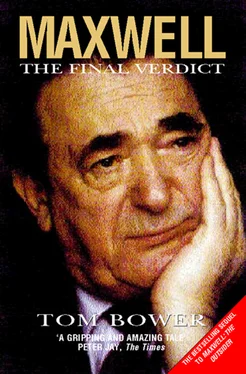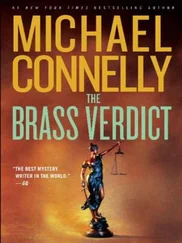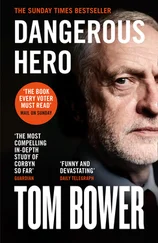1 ...8 9 10 12 13 14 ...35 Goldmans already enjoyed a relationship with Maxwell. In 1984, the bank had rented office space from him in Holborn, and Sheinberg had organized the financing of his purchase of the Philip Hill Investment Trust in 1986. Despite some misgivings, Goldmans had also welcomed the business of floating 44 per cent of Berlitz in 1989, although the negotiations over the price had provoked deep antagonism, especially against Kevin. To prove his macho credentials, the son had telephoned the banker responsible at 4 a.m. New York time, to quibble about the price. ‘Both Maxwells behaved appallingly,’ recalled one of those involved. ‘Kevin worst of all. We soon hated them.’
Yet Maxwell’s business was too good to reject. The echo of the lawyers’ cries in Maxwell House – ‘Bob’s been shopping!’ – whenever the Chairman’s settlement agreements arrived from stockbroking firms, encouraged brokers like Sheinberg to seek his lucrative business. Although Sheinberg was renowned for his dictum, ‘There are no friends in the business, and I don’t trade on the basis of friendship,’ his staff in London noticed an unusual affinity between him and Maxwell. Some speculated that the link lay in their mutual interest in Israel, while others assumed it was just money. Maxwell was a big, brave gambler, playing the markets whether with brilliant insight or recklessness for $100 million and more a time, and Sheinberg was able to offer expertise, discretion and – fuelling his colleagues’ gossip – the unusual practice of clearing his office whenever Maxwell telephoned. Their kinship extended, so the gossip suggested, to Sheinberg’s readiness to overnight in Maxwell’s penthouse, to ride in Maxwell’s helicopter and even to use Maxwell’s VIP customs facilities at Heathrow airport – suggestions which Sheinberg denied.
Acting as a principal and occasionally as an adviser, Sheinberg had already undertaken a series of risks which had pleased Maxwell. On the bank’s behalf, the broker had bought 25 million MCC shares and, in controversial circumstances in August 1990, as MCC’s price hovered around 170p, he had bought another 15.65 million shares as part of a gamble with Maxwell that the price would rise. Maxwell had channelled the money for that transaction through Corry Stiftung, one of his many Liechtenstein trusts. In the event, the Publisher had lost his gamble and Goldman Sachs had been officially reprimanded for breaking the City’s disclosure regulations. That, however, Sheinberg blamed upon Goldmans’ back office, since fulfilling the legal requirements was not his responsibility. Nevertheless, by November 1990, the bank was holding 47 million MCC shares, a testament of faith which could be judged as either calculated or reckless.
As the pressure on Maxwell increased, rival traders in London watched on their screens as, at precisely 2.30 p.m. every afternoon, Goldman Sachs ‘hoovered up all the available MCC shares’. The bank’s commitment went further than was normal for a market-maker. In gratitude for the vast speculative foreign exchange deals bestowed by Maxwell on John Lopatin, a Goldman Sachs foreign exchange executive, and for Maxwell’s considerable share trading, the bank’s loans were mounting. ‘I don’t promise what I can’t deliver,’ quipped Sheinberg to the Publisher, keen to emphasize his blue-sky honesty. To Sheinberg’s staff, though, it seemed that the American was close to Maxwell, more like a colleague than a pure broker. But Sheinberg, privy to so much, knew only what suited his secretive client. The Chinese walls throughout Maxwell House were so thick that only Kevin and a handful of accountants and investment advisers in his private office were permitted to transcend the deliberate compartmentalization. Inevitably, the secrecy bred loneliness.
Maxwell’s loneliness was aggravated by the absence of Andrea Martin, his small, demure personal assistant whose unexpected promotion from receptionist had been won after she spoke impressive French during a trip to Paris. For nearly four years until May 1990, the blonde Martin had uncomplainingly worked arduous hours, travelled extraordinary distances and loyally kept those secrets which Maxwell divulged. At the end of the working day, when he retired to his bedroom in the penthouse, Martin would enter, kick off her shoes and sit on the sofa while her boss ordered refreshments from Douglas Harrod, his entertainment manager: ‘Let’s have never ending champagne, Douglas, and smoked salmon and caviar.’ The tall, benign, well-dressed butler, whom Maxwell had gleefully poached from Rupert Murdoch, would oblige with an obedient smile. After supervising the delivery of his master’s order, he would close the heavy double doors. Maxwell, he realized, was ‘besotted by Andrea’. Harrod was less clear what Andrea Martin ‘could see in someone like Robert Maxwell except a high salary’. But he had noticed a special relationship of ‘endearments and those sort of things’. However, those days had sadly passed. In the aftermath, Andrea Martin always insisted that their relationship had been strictly professional.
A few months earlier, Maxwell had summoned John Pole, his head of security. A former detective chief superintendent employed for thirty years at Scotland Yard, where he had earned sixteen commendations, Pole had become accustomed, like all Maxwell’s staff, to responding unquestioningly to the summons day and night, regardless of the inconvenience. ‘We need to talk,’ growled Maxwell as he replaced the telephone receiver. Minutes later Pole was sitting erect and attentive opposite his employer, ‘I’m concerned about Andrea Martin’s loyalty,’ sighed Maxwell. Pole had noticed the millionaire’s infatuation with the young woman. ‘She knows a lot of confidential information and I fear she’s having an affair with Nick Davies. She has promised me that it’s over, but I don’t trust him and she might be telling him more than is healthy.’
Davies was the snappy foreign editor of the Daily Mirror , a journalist generally disliked by his colleagues, who had given him the sobriquet ‘Sneaky’. Maxwell suspected Davies’s loyalty, but was uncharacteristically unsure how best to neutralize an employee who had invaded the heart of his private territory. He then uttered the phrase which preceded his most intimate instructions to Pole: ‘I need to know if this person is being loyal to me.’ It was Maxwell’s euphemism for instructing that he wanted Andrea Martin’s telephone tapped.
Maxwell had long enjoyed the use of listening devices or bugs. His black briefcase contained a concealed tape recorder operated by a turn of the lock, and a bug had been inserted into a table lamp in his home. During the 1984 negotiations with the Mirror Group’s trade unions, he had used crude tape recorders to monitor his adversaries’ negotiating position. In later years, another former police officer in his employ was regularly to bring him cassettes of taped telephone conversations among his own executives. Sitting in his apartment at the end of the day, the congenital eavesdropper would race through the tapes listening for clues to disloyalty, weaknesses or hidden mistakes. In an atmosphere reminiscent of Stalin’s Kremlin, Pole had supervised in 1988 the concealment of two microphones in Maxwell’s own office – activated by a switch under his desk – and one in the conference room in the Mirror building. A microphone was also secreted in Kevin’s office in Maxwell House. This followed the disappearance of the banker’s draft worth £4.7 million (see p. 10), Telephone taps on the suspect revealed nothing. The draft had never been cashed.
Maxwell’s ruse was to invite guests to remain in Kevin’s room or the conference room while he excused himself briefly to tend another chore. Lumbering along to his own office, he would unlock the cupboard behind his desk and activate the recording machines, which Pole had rendered foolproof to accommodate his ‘banana fingers’. Having eavesdropped on the conversations to glean his competitors’ secrets, he would return at the appropriate moment to exploit his advantage. The subterfuge had won him undeserved acclaim as an outstanding negotiator, Pole’s tap on Andrea Martin’s telephone produced different results.
Читать дальше












